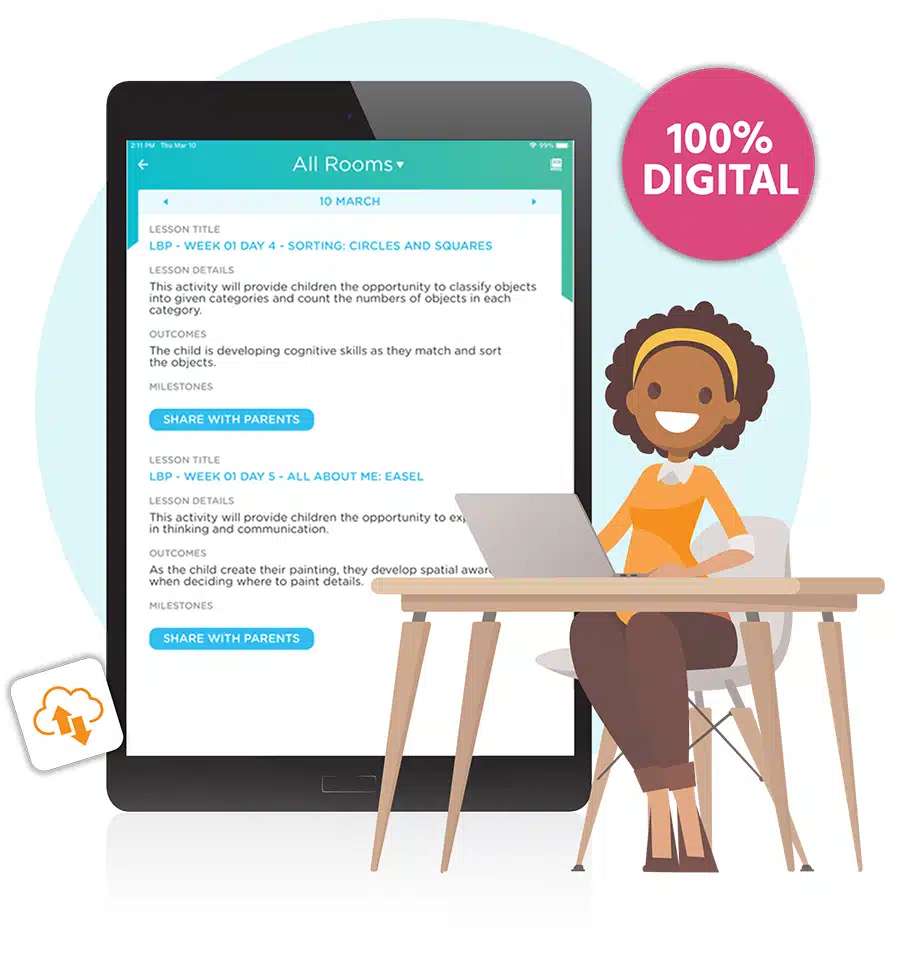
Associative play is one of the stages of play comes from Mildred Parten’s 1932 publication “Social Participation among Preschool Children,” a work still cited today. Associative play in child care centers and daycares is a vital part of helping children development.
Parten defined six types of social play that are typical for children in different phases of child development. Children may progress through the stages at different rates, and the stages often overlap with each other with children exhibiting behaviors from more than one stage at a time.
Let’s take a closer look at associative play!
What Is Associative Play?
Associative play is a stage of social play in which children start to interact with each other during playtime. It typically emerges in the toddler and preschool years, usually around 3 to 4 years old. At this stage, children are still developing their social skills, and associative play represents a significant milestone.
The associative play stage is when kids truly begin to play together. They may take turns with toys and make early attempts at coordinating with each other by associating their respective play into a shared theme.
Their play directly engages with other children and their activities interact, but each child is making up their own rules or story and the play is largely unstructured. The object is simply playing together, not the game itself. That makes this a great stage to start introducing small group activities.
This type of play signifies a shift in the child. Instead of being more focused on the activity or object involved in play, children begin to be more interested in the other players, according to Michigan State University.
Associative play isn’t as structured as cooperative play, in which kids work together towards a common goal, but it’s a significant step forward in their social development. It’s like the training wheels for more complex social interactions.
Why Is Associative Play So Important?

There are several good reasons to celebrate and encourage associative play skills:
Building Social Skills: Associative play helps kids learn vital social skills such as sharing, taking turns and cooperating with others. These skills are crucial not just for playtime but for later in life too.
Language Development: When children engage with their peers, they have the opportunity to communicate and express themselves verbally. This boosts their language development and helps them become better communicators.
Emotional Intelligence: Through associative play, children learn to understand and manage their emotions. They also gain empathy by considering their playmate’s feelings and needs.
Creativity and Problem Solving: As children interact with others, they encounter different ideas and perspectives. This sparks creativity and encourages problem solving as they navigate playtime together.
Fun and Friendships: Associative play is fun! It’s a time for laughter, sharing secrets and making new friends. These early friendships can be the foundation for future relationships.
Examples of Associative Play
Parallel play, the stage of play that develops in younger children before associative play, develops into associative play when children’s activities interact. For instance:
- A child playing with a doll set makes their doll “friends” with another child’s doll and takes turns using the hair brush, but one child’s doll is a princess while the other child’s doll is a superhero.
- Two children may play on a jungle gym together, making sure to try the same activities at the same time, such as using the slide or swings together.
How to Encourage Associative Play

Set the stage! Create a play environment with a variety of toys that encourage interaction, like building blocks or art supplies. Also model social behavior. You must demonstrate good social skills in your interactions with your child and others.
And be patient. Remember that children develop at their own pace. Some may transition to associative play earlier than others. Celebrate the small victories along the way, like the first time a child shares a toy or invites a friend to play.
How an Early Childhood Education Curriculum Can Help!

Associative play is a stepping stone to more complex social interactions and lays the foundation for future friendships. Developmentally appropriate play is an important part of how a child learns.
Procare Early Learning powered by Learning Beyond Paper is an all-digital early childhood curriculum specifically designed to meet the unique needs of educating children from infancy through pre-kindergarten.
The curriculum is embedded into Procare, making it easier and less time-consuming for busy teachers and administrators to provide high-quality education.
With Procare Early Learning powered by Learning Beyond Paper, child care centers can:
- Equip teachers with state-of-the-art online curriculum at their fingertips
- Dramatically reduce the amount of time spent on lesson planning each week
- Offer children a high-quality, developmentally appropriate curriculum
- Save money with this cost-efficient solution that’s integrated with Procare
This curriculum can be used in ALL child care center classrooms, with 52 weeks of lesson plans and more than 4,000 daily activities for infants, toddlers, preschoolers and pre-kindergarteners. Learning areas include STEAM, language and literacy, physical development, cognitive, music and movement as well as interactive reading. Plus, teachers get tips and tools they can use in real time!
Procare is the only solution that can deliver the entire early childhood education ecosystem — lesson planning, lesson delivery within the classroom as well as assessment and parent engagement. Being able to do all of these with one platform simplifies classroom management and planning!
How much time and money could your child care center save using a digital curriculum designed for young learners? Enter your number of staff, number of students and type of program into our online calculator to learn your potential savings!



